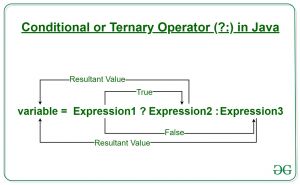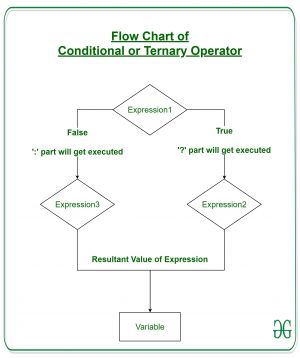JAVA: Operator Ternary dengan Contoh
Operators constitute the basic building block to any programming language. Java too provides many types of operators which can be used according to the need to perform various calculations and functions, be it logical, arithmetic, relational, etc. They are classified based on the functionality they provide. Here are a few types:
Operator merupakan blok bangunan dasar untuk bahasa pemrograman apa pun. Java juga menyediakan banyak jenis operator yang dapat digunakan sesuai dengan kebutuhan untuk melakukan berbagai perhitungan dan fungsi, baik itu logika, aritmatika, relasional, dll. Diklasifikasikan berdasarkan fungsionalitas yang disediakan. Berikut beberapa jenisnya:
- Operator Arithmetic
- Operator Unary
- Operator Assignment
- Operator Relational
- Operator Logical
- Operator Ternary
- Operator Bitwise
- Operator Shift
This article explains all that one needs to know regarding Arithmetic Operators.
Artikel ini menjelaskan semua yang perlu diketahui tentang Operator Aritmatika.
Ternary Operator
Java ternary operator is the only conditional operator that takes three operands. It’s a one-liner replacement for the if-then-else statement and is used a lot in Java programming. We can use the ternary operator in place of if-else conditions or even switch conditions using nested ternary operators. Although it follows the same algorithm as of if-else statement, the conditional operator takes less space and helps to write the if-else statements in the shortest way possible.
Operator ternary Java adalah satu-satunya operator kondisional yang membutuhkan tiga operan. Ini adalah pengganti satu baris untuk pernyataan if-then-else dan banyak digunakan dalam pemrograman Java. Kita dapat menggunakan operator ternary menggantikan kondisi if-else atau bahkan mengganti kondisi menggunakan operator ternary bersarang. Meskipun mengikuti algoritma yang sama dengan pernyataan if-else, operator kondisional membutuhkan lebih sedikit ruang dan membantu menulis pernyataan if-else dengan cara sesingkat mungkin.
Sintaks:
variable = Expression1 ? Expression2: Expression3
If operates similarly to that of the if-else statement as in Exression2 is executed if Expression1 is true else Expression3 is executed.
if(Expression1)
{
variable = Expression2;
}
else
{
variable = Expression3;
}
Contoh:
num1 = 10; num2 = 20; res=(num1>num2) ? (num1+num2):(num1-num2)
Since num1<num2, the second operation is performed res = num1-num2 = -10 Flowchart of Ternary Operation
Example 1:
// Java program to find largest among two
// numbers using ternary operator
import java.io.*;
class Ternary {
public static void main(String[] args)
{
// variable declaration
int n1 = 5, n2 = 10, max;
System.out.println("First num: " + n1);
System.out.println("Second num: " + n2);
// Largest among n1 and n2
max = (n1 > n2) ? n1 : n2;
// Print the largest number
System.out.println("Maximum is = " + max);
}
}
Output
First num: 5 Second num: 10 Maximum is = 10 Example 2:
// Java code to illustrate ternary operator
import java.io.*;
class Ternary {
public static void main(String[] args)
{
// variable declaration
int n1 = 5, n2 = 10, res;
System.out.println("First num: " + n1);
System.out.println("Second num: " + n2);
// Performing ternary operation
res = (n1 > n2) ? (n1 + n2) : (n1 - n2);
// Print the largest number
System.out.println("Result = " + res);
}
}
Output
First num: 5 Second num: 10 Result = -5

